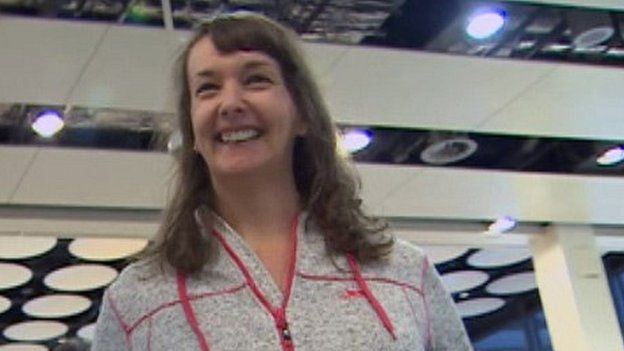Ebola nurse no longer critically ill
- Published

UK nurse Pauline Cafferkey is no longer critically ill with Ebola, London's Royal Free Hospital says.
In a statement, the hospital said she was "showing signs of improvement".
Ms Cafferkey, from Glasgow, was diagnosed with Ebola in December after returning from Sierra Leone. It was announced she was in a critical condition on 4 January.
The 39-year-old had volunteered with other UK NHS staff for the charity Save the Children in West Africa.
The full statement from the hospital said: "The Royal Free Hospital is pleased to announce that Pauline Cafferkey is showing signs of improvement and is no longer critically ill.
"She remains in isolation as she receives specialist care for the Ebola virus."
Ms Cafferkey has been treated with experimental drugs and has received blood plasma from another British nurse, Will Pooley, who recovered from an Ebola infection last year.
Checks
She had travelled home to Scotland via Casablanca, Morocco, and Heathrow Airport in London.
She was initially screened at Heathrow, where her temperature was normal, despite telling officials that she felt unwell.
Her temperature was taken a further six times within 30 minutes, but it was normal each time and she was cleared to fly on to Scotland.
Ms Cafferkey was then placed in an isolation unit at Glasgow's Gartnavel Hospital after becoming feverish, before being transferred by RAF Hercules plane to London on 30 December, and taken to the Royal Free's specialist treatment centre.
Prof Jonathan Ball, Professor of Molecular Virology, University of Nottingham, said: "This is really good news - the team at the Royal Free have done a fantastic job.
"We will never know if investigational drugs and convalescent plasmas contributed to her improvement, but it does once again highlight the huge benefits that modern well-resourced critical care interventions can bring to those suffering from severe Ebolavirus infection.
"Although we've only seen a small number of cases in the West, the survival rate is well above that observed for those who remain in West Africa.
"The major factor being the standard of care and resources available - that's why treatments and vaccines might still be important in the longer term fight in West Africa.
"Hopefully this is a sign that Pauline is well on her way to full recovery, although it might be some time until she tests negative for the virus, and is allowed out of isolation."
Ebola is transmitted by direct contact with the bodily fluids of an infected person, such as blood, vomit or faeces.
The virus has killed more than 7,800 people, almost all in West Africa, since it broke out a year ago.
The World Health Organization says the number of people infected by the disease in Sierra Leone, Liberia and Guinea has now passed 20,000.
- Published30 December 2014
- Published8 October 2014